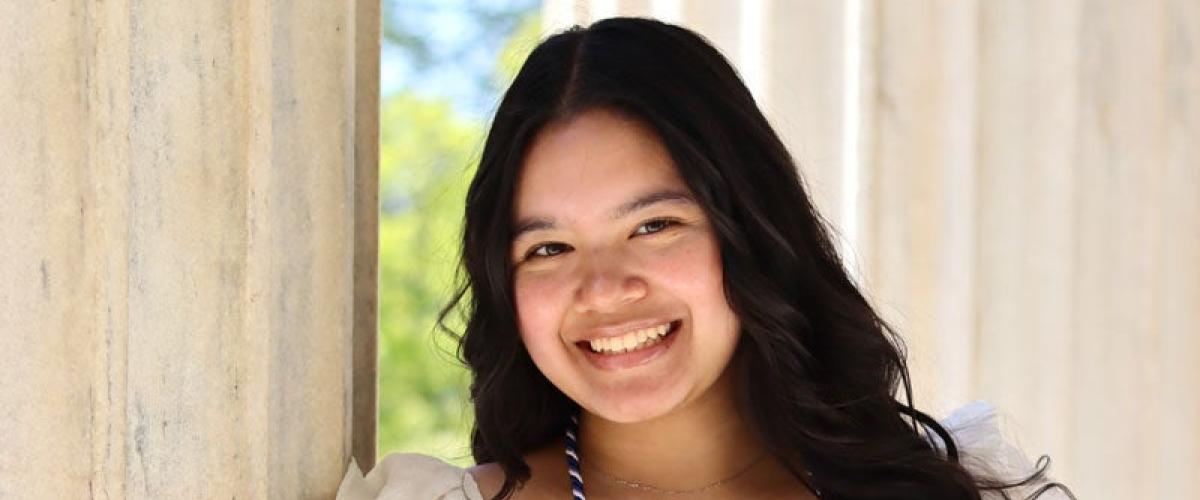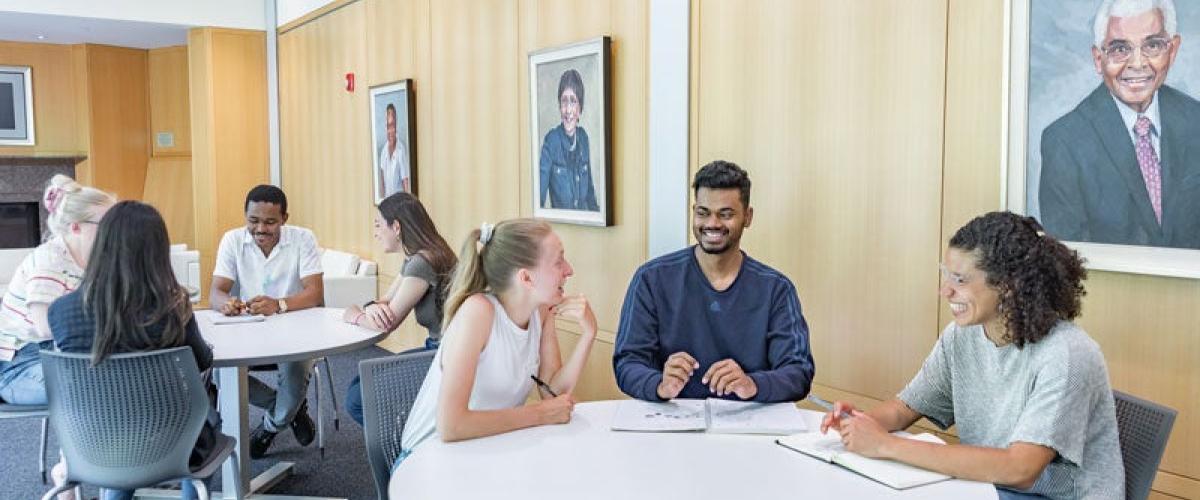Classroom Without Walls welcomes social work professionals and offers pathway to continued education
By Lauren Marchaza
Like many school social workers, Cassandra Klein has an office stocked with snacks, clothing, socks, coats, gloves and other essentials students might reach for throughout the day. She even has weekend bags of food and produce to send home with students in need.
As a family support specialist at Cleveland’s Memorial School, Klein’s job is to provide wraparound services to students and their families so they have everything they need to succeed at school.
“I try to make sure families have resources so that education becomes their top priority,” Klein said.
Despite her ability to provide families with so many of the basics that help ensure their success, there was one thing she never felt comfortable offering.
“If I’m grieving, I feel like I have a pretty healthy way of dealing with it. But when other people grieve—especially like little kids—I’m just like, ‘Are you OK?’” Klein explained. “I’m just not that great at comforting others.”
So when she saw an email last winter from a colleague about the “Social Work with Death, Grief and Loss” course offered through a new program at Case Western Reserve University’s Jack, Joseph and Morton Mandel School of Applied Social Sciences, she saw an opportunity to learn.
“I’d like to learn about grief and loss,” she recalled thinking. “Maybe this will help give me a little more insight.”
The experience also gave her the chance to entertain another idea she had: earning her master’s degree.
As it turned out, this new program—Classroom Without Walls—was designed to spur social workers like Klein to pursue both.
The Mandel School launched the program for two purposes: to create transformative learning experiences for both students and community learners—social work professionals with bachelor’s degrees who have worked in human services—and to encourage social work professionals to further their careers by enrolling in the Master of Social Work (MSW) program. Community learners, who hail from various Cleveland organizations, learn alongside traditional MSW graduate students, bringing real-life experiences to the class.
To remove barriers to class participation, some of the community learners receive a $1,000 stipend and can enroll tuition-free for up to three classes—providing them increased access to advanced education and a pathway toward a Mandel School degree.
“Access to quality education remains one of the most powerful forces that promote equity in America,” said Dean Dexter Voisin, PhD, who has pioneered the program. “Classroom Without Walls promotes educational equity, inclusive excellence and collaborative learning.”
Start of something good
When David B. Miller, PhD, director of international education program and chair of the Master of Social Work program, heard the idea for Classroom Without Walls last year, he knew it would be a perfect fit for the Mandel School.
“Dean Voisin really wanted to open up the classroom to the community,” he said. “The Mandel School has a long history of being community-oriented. Classroom Without Walls helps us build on that.”
“Classroom Without Walls is a great opportunity for shared learning, to show individuals in the community that the citadel of Case Western Reserve— when you peek behind the curtain—has so much to offer. And that you should not be afraid of taking the opportunity to come inside and learn.”
—David B. Miller, PhD
First, Miller and Voisin needed to decide on a class to pilot for the program. They knew they had to find a relatable topic that would resonate with students and community learners alike.
They settled on death, grief and loss.
“It’s [a topic] that many people could understand and work with,” said Miller, who has taught a course on the subject for many years and now teaches the Classroom Without Walls pilot course. “I can guarantee you there’s nothing like writing your own obituary or drawing a picture of what you think death looks like. We are dealing with a subject that is very universal to everyone.”
The Mandel School began recruiting community learners to enroll in the course and, before long, about 30 had applied. Ultimately, the class ended up with seven traditional MSW students and 10 community learners. That includes Yvonne Pointer, a Cleveland-based anti-violence activist, author, motivational speaker, philanthropist and member of the Ohio Women’s Hall of Fame. With her vast experience in community work and grief support, Miller invited her to be a “community connector” in the class.
It’s this unique combination of students, Miller said, that creates a special dynamic unlike any other found on campus.
“They bring a richness to the class,” he said. “Our [traditional] students get to see, understand and hear from professionals in the field who are dealing with adolescents, adults and older adults.”
Conversely, he explained, the community learners get a sense of what it’s like to pursue graduate degrees and apply their newfound knowledge—in real time—in their professional and personal lives.
“The program has impacted my life both personally and professionally,” said community learner Arlene James, who works with emancipated foster youth at Cuyahoga Community College. “The in-class exercises, reflection papers, research on various topics, presenters and student presentations have been instrumental in my learning experience,” she continued, and noted that the content of the course has been so intriguing, the group often finds themselves talking long after class has ended.
“There’s a lot of give and take about what’s going on, and those ‘aha’ moments that really enrich everyone’s learning,” said Miller. “There’s just this energy, and they take it with them.”
Mutual learning
Although the original plan was to pilot only one course, Voisin saw an opportunity to incorporate another, brand-new course that he believed—because of both its content and format—would have broad appeal.
“Operationalizing Antiracism for Everyday Impact” is a course that aims to empower participants with tools, techniques and practices to effectively counter racism. Instead of being grounded in theory alone, this course helps students take action against racism in practical ways.
“What we want to see is greater intentionality around antiracist practice leading to the disruption of racism in its many, many forms,” said Mark Joseph, PhD, the Leona Bevis/Marguerite Haynam Professor in Community Development, “whether that be internalized inside of us, interpersonal, institutional or systemic.”
Although there are lots of conversations about racism and white supremacy today, there are far fewer discussions about the everyday tools and strategies needed to fight it, explained Assistant Professor Jenny King, who co-teaches the course alongside Joseph and PhD candidate Braveheart Gillani.
The unique hybrid, high-flex format of the course—which allows students to attend classes virtually or in person—was likely a draw for its 24 students, five of whom are community learners.
“The idea was to make it as accessible for as many different types of students as possible,” said King. “There’s a lot happening that makes it really nice to have a team of the three of us to manage the physical classroom, the online classroom, the technology…all of those different pieces.”
Much like the subject of death, grief and loss, countering everyday racism is one that speaks to many and is applicable to all. That’s been evident to King, who feels energized by the synergy of the classroom discussions.
“[The students] come from all different areas of life and work and practice,” said King. “We see the ripple effect of what the students are taking from the course, integrating into their own lives and then taking into their spheres of influence so into their work and their practices in their communities.”
Gwendolyn Garth, a community learner, activist and artist, has found value beyond the content of the course. “It was also a place of healing,” she said. “This class was a kind of medicine for me! The environment created was safe and I felt free to explore my own biases—and to be real in sharing them.”
The class participants learn from each other, but they’re not the only ones learning in the classroom. Gillani has found lessons in his role as one of the course’s instructors. “To be able to teach with two experienced, seasoned, grounded faculty members in such an intimate way—this is the highlight of my PhD education,” he said. “This is the deepest learning experience I’ve had so far.”
King agreed. “There’s a lot of learning from one another that’s happening in the course,” she said, “and that has been a really beautiful thing to see.”
Planning for the future
As the spring semester wraps up, Miller, Voisin and other faculty are planning next steps for Classroom Without Walls—possibly for as soon as the summer. They’re considering courses that are part of the generalist foundation for all MSW students, such as social welfare policy and human development. Some classes may even be offered online to better accommodate working professionals.
“I hope the Classroom Without Walls model will inspire other schools of social work to do the same,” said Voisin. “The core of this program taps into our shared mission of prompting a more equitable society.”
As more students enroll in the program, Voisin hopes community learners will consider themselves part of the Mandel School and, ultimately, choose to pursue graduate degrees.
Miller hopes they’ll become ambassadors for the Mandel School as well.
“Classroom Without Walls is a great opportunity for shared learning,” Miller said, “to show individuals in the community that the citadel of Case Western Reserve—when you peek behind the curtain—has so much to offer. And that you should not be afraid of taking the opportunity to come inside and learn.”
Read more stories like this in the Spring 2024 edition of Action.







